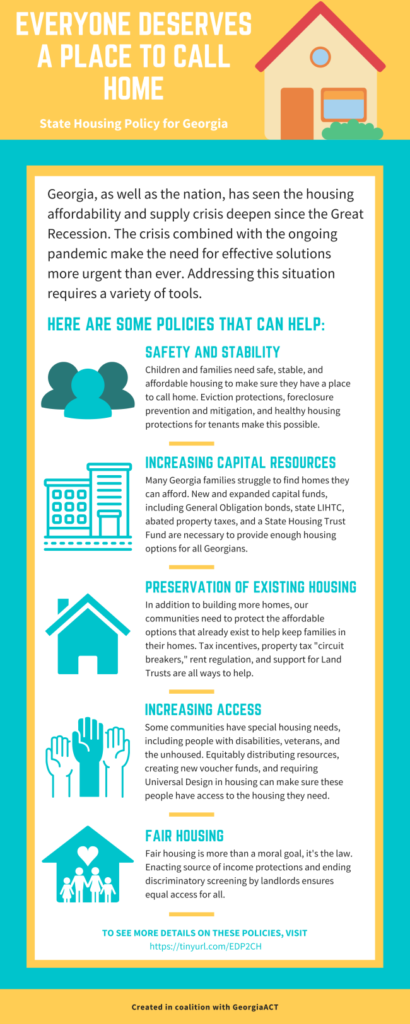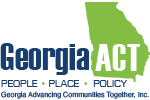
Solutions to Housing
Challenges Intensified by Covid-19
Covid-19 has focused a bright new light on stresses and disruptions that plague Georgia’s housing markets even in good times. Under pandemic conditions these factors threaten to deepen family instability, increase homelessness and expand poverty, while also accelerating inequality and potentially bankrupting thousands of small landlords who play a vital role in preserving housing affordability. In high demand urban areas the pandemic has further roiled housing markets already staggered by multiple crises including supply bottlenecks, erosion of existing affordable inventory, and families burdened by exorbitant rental costs—often exceeding 50% of household income.
The good news is that there are approaches to creating housing affordability that address the interests of all parties—renters, owners, families, and investors, as well as government agencies charged with reducing social distress by innovating policies that target market dysfunction and encourage economic growth. The Ad Hoc Housing Policy Group has assembled key facts and recommendations that form a workable framework for dealing with critical gaps and deficiencies in Georgia’s rural, urban, and suburban housing markets:
Increase Access to Housing. Expand low-income voucher programs by leveraging federal funds with state resources and mandating that all jurisdictions include a housing element in their state-mandated comprehensive plans. Targeted voucher programs can prioritize people who have greatest difficulty finding private housing, including veterans, homeless individuals, and Georgians in rural communities who may experience unique barriers to safe affordable housing.
Increase Capital Resources. Use the full faith and credit of the State of Georgia to issue General Obligation Bonds, providing a deep pool of capital to support a range of stabilizing housing initiatives. Allow local government flexibility in the use of tax abatements, housing trust funds, and other strategies to incentivize housing production, while also protecting the Low Income Housing Tax Credit program, which currently produces more affordable units than any other funding source. Redeploy unused TANF reserves to provide funding for emergency housing, preventing homelessness and reducing the long-term cost of supporting and re-stabilizing displaced families.
Preserve Existing Affordable Inventory. Empower local governments to promote neighborhood stability by indexing rent increases to broader market variables that normalize prices. Offer incentives such as tax exemptions to encourage the rehabilitation of older housing developments. Partner with tenant associations and non-profit housing developers to acquire and preserve affordable rental properties.
Stabilize Communities. Increase protections against displacement such as providing a right to cure before eviction is filed, allowing eviction only by cause, and increasing legal assistance for families facing eviction. Empower local governments to implement housing inspection programs, pursue lead abatement, conduct hazard assessments, and ensure housing stocks are safe and healthy. Create “circuit breakers” to protect legacy homeowners from displacement due to rapidly rising housing values.
Download our Fact Sheets to learn more about each of these policies
Additional Resources
Download a snapshot of the state of housing in Georgia
Download a sample letter to send to your local legislators and candidates
Download a publicity package with graphics and sample social media posts you can use to get the word out
Platform Supported By:
Georgia ACT – Bambie Hayes-Brown
Georgia STAND UP – Kate Little
Local Initiatives Support Corporation (LISC)
Georgia Supportive Housing Association
Metro Fair Housing Services, Inc.
The National Incarceration Association, Inc.
Sign on here to show your organization’s support
